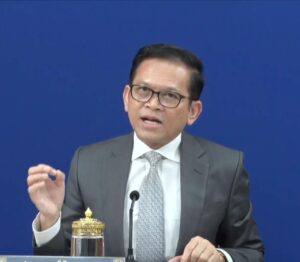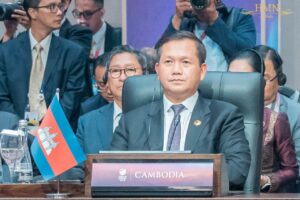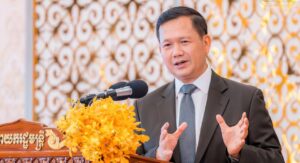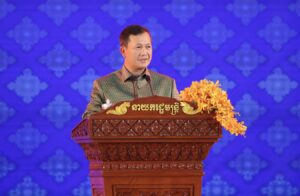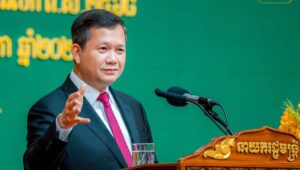Selected Comments Samdech Moha Bovor Thipadei Hun Manet, at the graduation ceremony for student teachers and the inauguration of the Phnom Penh Pedagogical Institute’s student hostel [Unofficial and translations]
![Selected Comments Samdech Moha Bovor Thipadei Hun Manet, at the graduation ceremony for student teachers and the inauguration of the Phnom Penh Pedagogical Institute’s student hostel [Unofficial and translations]](https://grandnewsasia.com/app/uploads/2024/07/240704-002.jpg) Selected Comments Samdech Moha Bovor Thipadei Hun Manet, at the graduation ceremony for student teachers and the inauguration of the Phnom Penh Pedagogical Institute’s student hostel [Unofficial and translations]
Selected Comments Samdech Moha Bovor Thipadei Hun Manet, at the graduation ceremony for student teachers and the inauguration of the Phnom Penh Pedagogical Institute’s student hostel [Unofficial and translations]
[1]
(1) Low dropout rate of student teachers
Congratulations to the 266 teacher graduates who have worked hard to achieve their goals. After the graduation, you have transformed yourselves from being students to be teachers […] a few of you that I met on my entrance seem to have been committed and excited. Walking through the exhibition booths, I probed what is the abandonment rate? The answer has been that (those who gave up were very) few […] everyone has his/her own challenges […] but endeavored to make efforts in learning […] while we are pursuing reform […] and when become teachers, we take what we learnt from the training to build the capacity of students in schools […] What the Royal Government strives to do is put in place policies, reforms, create opportunities and organize infrastructure, whereas seizing opportunities, making individual planning and actual implementation is up to the students, parent, family, teachers, and management […]
(2) The Phnom Penh Pedagogical Center has transformed into the Phnom Penh Pedagogical Institute
[…] This 70-room student hostel indicates the long-term vision of Samdech Techo (now the President of the Senate) regarding the RGC’s commitment to betterment its education. In one booth (of the exhibition), there was a mentioning of how we started training of the first batch of teachers in September 1979. After the liberation from the (Pol Pot regime,) about 20% to 30% of the country’s teaching staff survived the killing […] and we still have a shortage of teachers in some (schools these days) but more have been deployed to every corner of the country in the last more than 40 years […] in seven years, the Phnom Penh Pedagogical Center has transformed into the Phnom Penh Pedagogical Institute, focusing on the training of student teachers, fulfilling its duties and achieving many proud achievements. We have upgraded the (college) teacher qualification from 12 plus 2 to 12 plus 4. Across the country, there are three schools as such in Battambang, Phnom Penh and the National Institute of Education […]
(3) Strengthen the education sector by organizing curriculum infrastructure, study methods, teaching aids and teachers
I thank the countries and development partners, including the Government of Japan, through JICA, for supporting the Ministry of Education, Youth and Sports in establishing the Phnom Penh and Battambang Pedagogical Institutions […] UNICEF, UNESCO, VVOB, KIZUNA, NIPPON FOUNDATION, etc. for participating in building and strengthening the capacity of the two institutes […] and for the efforts made in strengthening the education sector, organizing infrastructure that (includes) curricula, study methods, study tools plus teachers. Partner participation in strengthening institutional capacity is important hereby sharing new methods and technologies […] together with thoughtfulness, quality assurance, especially in connection with what they must actually do […] with which, reform, reorganizing and modernizing curriculum and teaching methods shall be combined […]
(4) Teacher quality key in ensuring the quality of education and the country’s ability to develop
Human quality is a determinant of national capacity and development. As long as our human capacity is strong, we will be able to develop […] the determinant of the quality of human resources is education and training […] the quality of education and training is the determinant of the development of the country […] the backbone of the education sector is teachers [ …] (teachers) are the backbone of the education sector […] therefore, the quality of teachers is a key factor in ensuring the quality of education and the country’s ability to develop […] the Royal Government pays attention to strengthen the capacity and teacher quality, the basis of education reform […] whereas education reform efforts must focus on (capacity and quality) of teachers […]
(5) By 2024, national budget allocation for education rises to more than 911 million dollars
(The Royal Government has embarked on) plans and actions (regarding education reform) gradually from 2013-2014 until scoring current achievements, especially after 10 years of sharp reforms. The Royal Government has provided the largest share of national budget to be used for education sector. During the war, the defense budget was the largest. Immediately after the end of the war, national defense decreased […] in 2020, the national budget for education was more than 782 million dollars, and by 2024, it has increased to more than 911 million dollars, almost 1 billion dollars. We will continue to give high priority to education because the human resource determines everything […] should we not strengthen human resources in particular, the education sector as a whole, we are not up to date. On the contrary, by strengthening human resources, we create the resources that is going to create further resources […]
(6) Reform of teacher training institutions, improve teachers living standard and qualification
The 2013 Teacher Policy Action Plan, launched by the Ministry of Education […] focuses on four main goals […] firstly, the reform of teacher training institutions; secondly, consideration given to the living standard of teachers by focusing on salary increases; (3) improvement of the qualifications of teachers; and (4) the implementation of professional standards for teachers […]
Firstly, Reform of teacher training institutions. We upgraded from the Phnom Penh Pedagogical Center to an institute to increase the level (of training and) qualification of teachers […] we have raised our student teachers training formula from 12 (education) plus 2 (years of pedagogical training). The goal for the future is to raise the formula to 12 plus 4, which means that you have the opportunity to study for a bachelor’s degree, which will offer you not only the quality of education, but also the opportunity to go for Master degree […]
Secondly, taking into account the living standard of teachers, especially the salary […] regarding the 2013, according to the data I have here, we have increased the salary of Type C salary teaching staff from 300,000 Riel to more than 1.4 million Riel, or equivalent to 4.6 times in 10 years; Type B salary teaching staff from 438,000 riels to more than 1.5 million riels, or equivalent to 3.5 times; and Type A salary teaching staff from nearly 630,000 to more than 1.6 million. However, salary settlement is not the main settlement […] we have taken measures to reducing costs by providing social security funds for health, helping pregnant female teachers, etc. […]
In this regard, I urge (the Minister of Labor and Vocational Training) His Excellency Heng Sour and (the Ministry of) Social Affairs to figure out what to do […] regarding the provision of benefits in support of convicted women with pregnancy and/or childbirth. We should offer similar support that we do to the people and/or civil servants […] may the Ministry of Social Affairs […] discuss […] with the Ministry of Economy and Finance that is responsible in (working out the budget) […] we must help them […] though the mother made a mistake and had to serve for what they did but when they are pregnant, the babies are innocent and they are still our children […]
Thirdly, ensuring the indicators, qualification and professional standards of teachers […] the role of the (pedagogical) institute will play an increasingly important role in maintaining the quality and standards of teachers […] we must have a standard of education and cannot have teachers selected in one province to use different text book to teach student different from teachers in another […] teachers training must have the same standard in all areas […]
(7) Regarding appointment of head of Office of Education, let us stick to those with educational background
The selection of the head of Office of Education is very important. Someone asked me once if it is possible to appoint someone with a master degree in a different background – agriculture or management – (a director/official) of the Office of Education. My suggestion is that, regarding education, we should stick to those who have an educational background […] the selection of principals also must be standardized. We have taken a step to conduct trial decentralized selection process to the provinces […] in Battambang […] HE Sar Sokha presented that the success has not been 100% as some 30% are being selected not according to laid out principle. For me, even if it has only 1% discrepancy, we should consider it unimplementable […] the principal of a school is an important leader of the institution […]
(8) Strengthen the foundation of Khmer language and mathematics at primary level
I support this meeting where you discussed about the 12 years of intermediate reinforcement, with a focus on the primary level education. (The Minister of Education, Youth and Sports) HE Hang Chuon Naron has laid out plan to strengthen the basics of Khmer language and mathematics by increasing reading and writing […] we must focus on making students acquire strong Khmer language foundation from 1st to 6th grade […] I noticed this reading class […] I asked if we have books for them. We do provide 100% to the primary level. The book is very important […] according to some teaching methods now, less is taught by teacher in class but students are asked to read first and prepare for talking (making presentation) so that people are flexible and not practicing “Copy and Paste” […] not just learn to remember for a while but to know it well […]
(9) Community/family involvement in school building and development is important
Our population has growing rapidly […] with this speedy population growth, especially in areas that are former battlefields, we have had to build villages and therefore schools and infrastructures. Wherever roads are built, people are coming and villages start growing. With this development, former battlefields (have now become villages) […] for some places, where demand has grown fast, we have not been able to respond them yet. Some teachers have worked hard with the community to build bamboo houses and/or classrooms […] of course, we have deployed thousands of concrete buildings, but they have not been adequate to such growth. We continue to work on that. Community/family involvement in this matter is important […]
(10) Education at school, at home and in the general environment
There are three areas of education – firstly, in school, secondly, at home, and thirdly, in the general environment. Should the parents and teachers are working together to strengthen this work, I am sure it will have strong repercussion to prevent them from bad influence of the third environment. On the contrary, it will take the in-self value from home and from school to help improve this third environment. Now that social morality of some of our young people is moving towards improper trend, then participating in this strengthening is an important task. The fourth key measure is community and parental involvement in the form of PCP (Public Community Participation) to strengthen schools […] I have seen schools work to build on soft skill, which we should focus from the foundation […] while continuing to have the annual contest of model school and model teacher to expand the scope as much as we can. With regard to incentive, I think it is not necessary for the ministry to do it. Each school should take its ownership […] to motivate teachers in each school […] in each province and district, creatively […]
[2]
(11) Recruit the right candidate, fill in the need, keep them and be flexible We continue to take care of deploying additional teachers as well as recruiting teachers with flexibility in accordance with local needs and potentials […] the Ministry of Public Functions has worked with the Ministry of Education (Youth and Sports) to open additional ports (for recruiting more teaching staff). […] At the local level, there are trained teachers or those who have pedagogical background or have the ability to complete pedagogical training. We open the door to pull in technical contracts teachers at any level of teaching. If they were from the local community, it would be a plus. They have their homes already […] our goal is to “recruit the right candidates, to fill in the need, to keep them” and “be in a flexible manner” […]./.


